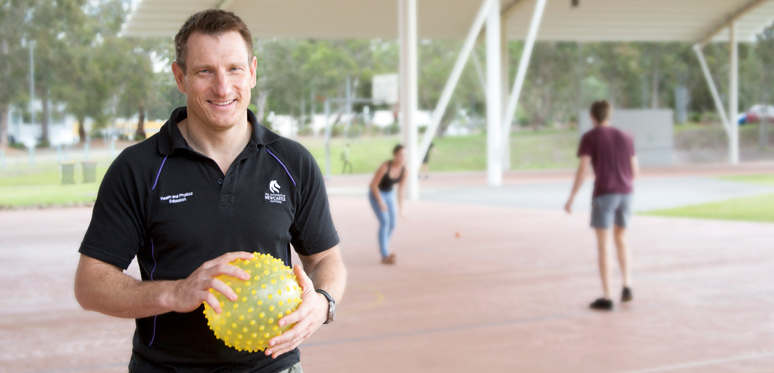Researcher Highlights
Q is for quality
Dr Drew Miller
Mentoring using the familiar and effective mantra 'work hard, play hard,' Dr Drew Miller is seeking to promote and produce holistic, evidence-based physical education programs for children and adolescents across the country.

Dr Drew Miller is at the top of his game - literally. He's discovering and experimenting with the latest in child and adolescent learning, sharing practical experiences of the many ways in which game-based activities have led to improvements in youth health, physical education and physical activity outcomes.
"Developing positive outcomes is about so much more than just replicating motor control skills, like bouncing a ball or swinging a bat," the enthusiastic investigator concedes.
"It's also about developing knowledge of how to play, as well as producing cohesive and inclusive activities in mixed-gender, mixed-ability settings."
"High quality physical education can produce a wide variety of outcomes."
As unconventional and forward thinking as they come, Drew is sitting comfortably in the space between the physical activity and physical education research fields. Believing a strategic mixture of both is key to "keeping kids in sports," the Central-Coast based academic is eager to inspire renewed, ongoing curiosity for regular recreation and sporting activity.
"There's not much encouragement for teenagers at the moment," he admits.
"People around the 14-15 year age mark reach a point very quickly where they plateau with their skills."
"So I want to change the way they're taught and the way they learn – if they can understand the game better and play the game better, they can hopefully get more out of it."
An educator dedicated to honing his craft, Drew is working closely with schoolteachers and community-level coaches to achieve this added value. Simultaneously creating and implementing novel professional development programs, the passionate scholar is looking to ensure his mentees are similarly at the top of their game.
"I was looking for a way to move the research surrounding continuing professional development into an intervention that had impact on teachers and students," he reveals.
"This is where PLUNGE (Professional Learning for Understanding Games Education) came from."
"It enabled learning and teaching tailored to the authentic environment in each classroom."
"I use role modelling, feedback and robust discussions about teaching practices to promote quality teaching that has a lasting, positive impact on students."
Down to a different science
A PE teacher by trade, Drew switched to a research career in 2007 when he undertook a PhD in Human Physiology at the University of Newcastle. An ambitious venture in the biomedical sciences area, the four-year probe sought to explore non-contact injuries in elite soccer and rugby competitors.
"Essentially, I looked at the characteristics of athletes that expose them to greater amounts of risk," he clarifies.
"I wanted to determine the factors we can change, like power outputs and posture, and the ones we can't, like limb length compared to torso length."
Detecting a handful of each, Drew's study found there's a bit of wiggle room where non-modifiable aspects are concerned.
"Once we know about them, we can do more protective work with the players," he explains.
"We can improve things like their lumbar control so they're not at such high risk of injury."
Educating about educating
Drew stayed on at the University at Newcastle after receiving his award in 2011, electing to work within the Priority Research Centre for Physical Activity and Nutrition. Working under Professor Phil Morgan during the one-year stint, the vibrant researcher managed the multi-award winning obesity prevention program 'Healthy Dads, Healthy Kids.'
Moving to the School of Education in 2012 to pursue "work that produced change in schools through a focus on the quality of physical education teaching", Drew designed and ran the PLUNGE projects.
"The first was a pilot study where we tested out the methodology of a professional development program," he recalls.
"The second was a larger randomised controlled trial."
"Over eight weeks, we trained teachers and worked with children in catholic schools across the region."
Extend and commend
The physical education expert has since branched out from these traditional scholastic settings, opting to spearhead a similar, adapted practice with netball coaches in and around Newcastle. This time devising and delivering a mentoring program over a 3-month period, Drew looked to evaluate the benefits of prolonged exposure to games-based activities that require decision-making.
"Skills-based teaching proclaims that if you don't know how to do a chest pass, you can't play netball," he explains.
"While this is obviously important, we say that if you don't know where to stand or how to communicate with the other players, you're never going to get the ball to be able to throw it in the first place."
"So we advocate a dual focus."
Though still processing the data from this creative collaboration, Drew is cautiously optimistic about its translation success.
"I think the results will replicate what we saw in schools, that helping coaches provide regular and more detailed feedback, and exposing the learners to sustained decision making leads to improvements in children's playing performances," he suggests.
"There has been real interest from the local associations about the project, and we're hoping to carry out an offshoot in the near future, perhaps with Netball Australia."
Meeting needs, changing lives
Closer to home, Drew is also evaluating a lifestyles project for a disability service provider in the Hunter.
"I'm helping them modify and evaluate the program to maximise outcomes," he says.
"Adjustments made will be based on research in behaviour change, nutrition and physical activity."
"Compared with the general population, people with intellectual disability have a higher prevalence of obesity, hypertension, and metabolic syndrome, so this is an important program for the health of this group in the hunter region."
The University of Newcastle acknowledges the traditional custodians of the lands within our footprint areas: Awabakal, Darkinjung, Biripai, Worimi, Wonnarua, and Eora Nations. We also pay respect to the wisdom of our Elders past and present.
